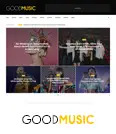The angst, tension and punch of 70s rock n roll is carefully curated in Daisy Jones & The Six’s AURORA. The album was officially released this past week, a day before its visual counterpart premiered on Prime Video. Based on Taylor Jenkins Reid’s best-selling book, “Daisy Jones & The Six,” the story recounts the band’s messy breakups, disastrous vices, and epic victories. Since fans of the original novel already loved the songs without even having to hear them, we can imagine it’s a relief to finally put a sound to the characters.
Because the album accompanies a narrative that audiences get to see, we’re granted more context than an actual album. Imagine if all those years ago, fans knew what was happening behind the scenes when Stevie Nicks sang, “You’ll never get away from the sound of the woman that loved you.” Or the chaos that ensued when Yoko Ono sat on George Harrison’s guitar amp. Or the argument that followed Simon & Garfunkel’s final track, “Bridge Over Troubled Water.” In an essay for Hello Sunshine, Reid wanted to write a story “about how the lines between real life and performance can get blurred, about how singing about old wounds might keep them fresh.” Lucky for us, that’s what AURORA is.
Perhaps the album’s magnum opus, “Look At Us Now (Honeycomb)” is the piece that bonds the protagonists together. Leader of The Six, Billy Dunne (played by Sam Claflin), and fresh-faced singer, Daisy Jones (played by Riley Keough), record the almost six-minute anthem upon their first meeting. With a constantly changing tempo, the song begins with a steady kick drum and a striking guitar line, reminiscent of “The Chain.” The rising and falling action of the music is palpable, with the vocalists dueting separately and then in frustrated harmony. Lyrically, it details a relationship between two people who are resigned. While other songs on the album like “Regret Me” and “Kill You To Try” emote rage and fight, “Look At Us Now (Honeycomb)” reflects on and grieves over what was lost.
At the center of the narrative is Daisy’s desire to be an artist, not a muse. This is made clear in “Two Against Three,” where Keough uses her folksy-blues voice to unfold the love-triangle drama further as she sings about a love that’s out of her reach. It’s raw and vulnerable, even if it’s not real. In the same sonic tone, “No Words” ends the album and the story on a somber note. A fitting closer, we’re removed from the intimacies between Billy and Daisy as they run out of things to say to each other. It’s the calm after the storm. Taking a more hippie approach rather than an arena-rock approach, “No Words” is a recipe for the meditative and melancholic.
While the album could never outdo its non-fictional equivalents, AURORA serves its purpose of emulating the greats. AURORA is nostalgic, but it’s not the heart and soul of 70s music. That kind of magnetism can only be found in the original era. With that being said, Daisy Jones & The Six’s one and only album beautifully immortalizes the beloved book.
Rating: 7/10
Stay updated on all things music by subscribing to Beyond The Stage!
- Andrew McMahon Talks Rituals, Milestones and Philanthropy - May 5, 2023
- Music Rec Monday: April 10, 2023 - April 10, 2023
- Music Rec Monday: April 3, 2023 - April 3, 2023








